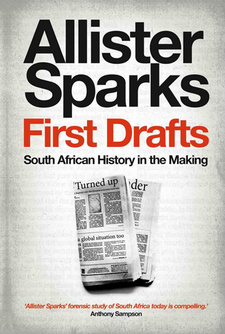First Drafts: South African History in the Making, by Allister Sparks.

First Drafts: South African History in the Making, by Allister Sparks. ISBN 9781868423460 / ISBN 978-1-86842-346-0
It was Philip Graham, legendary publisher of The Washington Post in the 1960s, who coined the epigram that the journalist’s role is to write “a first rough draft of history”. It is a concept that has long fascinated veteran journalist Allister Sparks, because it means that a collection of those rough drafts can present a different kind of South African history, a contemporaneous history.
A crime against the crime fighters (20. Feb 2008)
The campaign to disband the Scorpions was one of the worst features of the Zuma-Mbeki power struggle. The drive to make Zuma President required that the corruption charges against him be withdrawn. So the first step was to get rid of the special investigative unit that was working vigorously on the case. The second was to remove the head of the National Prosecuting Authority (NPA) who was determined to bring the charges against Zuma. Once both were achieved the way was open to stitch up the case. THE DECISION TO disband the Scorpions by merging them into the South African Police Force is both foolish and disturbing. It is foolish because it will inevitably diminish the effectiveness of the country's most successful crime-busting unit - for no good reason. The old adage applies: Tf it ain't broke, don't fix it.' The Scorpions are successful because they are a coherent, highly motivated unit. The SAPS are not. They have a dismal record accumulated over many years of sloppiness, abusive behaviour (witness the recent action against foreign refugees in Johannesburg's Central Methodist Church), poor leadership and a low level of community trust. The Scorpions' efficiency can only be diminished by forcing them to join such an outfit. Some of its members will be dispersed within the SAPS, others will quit. It is foolish because it comes as yet another hammer blow to South Africa's image among investors at an inopportune moment. The Eskom power crisis and the shortage of skills which it highlights have already slammed a brake on our economic growth rate: in the past 20 days a staggering R31-billion of foreign investment has left the country.Now comes this third whammy as evidence that the government is not serious about the fight against crime. Power, skills and crime are the three biggest disincentives to investors in South Africa. As more investment flows out of the country the rand will decline further, which will increase inflation, which will hurt the poor hardest - the very people Jacob Zuma has vowed to help. Above all it is foolish because it is unnecessary. No one has offered a single valid reason for disbanding the Scorpions. The only argument voiced is that they have violated their mandate by embarking on a political witch-hunt, which is palpable nonsense because you can't build up a 95 per cent prosecution success rate by pursuing unjustified investigations or fabricating evidence. We all know the real reason. It is because so many ANC members, including senior members, have been the subjects of Scorpions investigations. And rightly so. Because corruption has spread into the .ranks of the ruling party to an alarming degree. The party knows this. As Kgalema Motlanthe, then Secretary-General, admitted to Carol Paton in a major analysis published in a special Financial Mail report last year: The rot is across the board ... almost every project is conceived because it offers certain people a chance to make money. So instead of seeking to snuff out the investigations, the ANC leadership should work to end the rot in its own ranks, for they must know that nothing can corrode the soul of a political party - and destroy a country - so swiftly as the curse of corruption. Ask any Nigerian. Then again the decision to disband the Scorpions is deeply disturbing because of the way it was announced. It began as a policy decision adopted by the Zuma majority at the Polokwane conference. President Mbeki was clearly reluctant to implement it. One saw him in his State of the Nation address and again in a television interview last Tuesday night trying to filibuster the issue by saying it was very complicated and would have to be carefully considered in the context of reassessing the whole criminal justice system, including the recommendations of the Khampepe Commission which found there was no legal or constitutional merit in the argument that the Scorpions should be disbanded to establish a single police service. One therefore couldn't take a decision on the Scorpions in isolation, President Mbeki reasoned. Yet the very next day Safety and Security Minister Charles Nqakula stood up in the National Assembly and baldly announced that the Scorpions were indeed going to be disbanded. He did so in language that indicated it was a decision already taken. A fait accompli. [...]
This is an excerpt from the book: South African History in the Making, by Allister Sparks.
Title: First Drafts: South African History in the Making
Author: Allister Sparks
Type: History, Current Affairs
Publisher: Jonathan Ball Publishers
Johannesburg, South Africa 2008
ISBN 9781868423460 / ISBN 978-1-86842-346-0
Softcover, 21x25 cm, 300 pages
Weitere Buchempfehlungen
Opening Men's Eyes. Peter Brown and the Liberal Struggle for South Africa
Opening Men's Eyes tells the story of how Peter Brown had the scales of racial prejudice removed from his eyes, and how he set about opening the eyes of his compatriots.
Memories at Low Altitude
A story of war and peace in Mozambique and beyond, Memories at Low Altitude spans four decades of southern African history.


